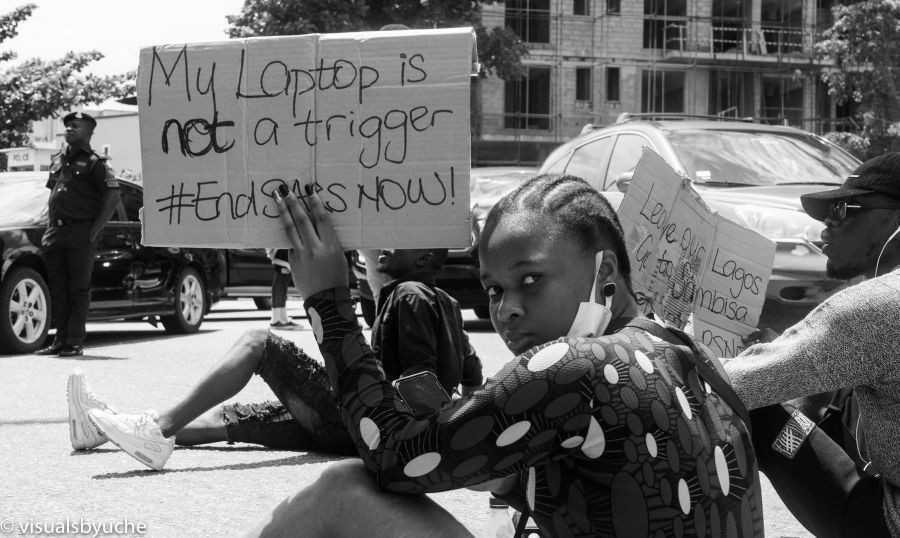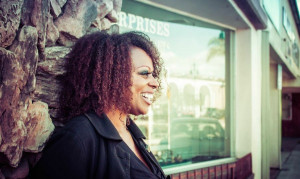SARS stands for Special Anti-Robbery Squad and was a unit set up in 1992 to focus on fighting armed robbery in Nigeria. But the unit somehow went rogue, with its officers adopting brutal tactics, extortion, profiling, coercion, cover-ups, and extra-judicial killings. Renowned Nigerian author Chimamanda Ngozi Adichie described SARS as a “money-making terror squad with no accountability.” Its focus shifted from robbery cases to pouncing on youths based on negative profiling, trumped-up charges, and random allegations. Young men with tattoos, dreadlocks, and in possession of laptops, iPhones and expensive cars have become immediate targets under SARS. The increasing adoption of digital business in the country by tech-savvy young people marked a corresponding increase in the negative profiling and targeting by the policemen, who often accused innocent victims of cybercrime. As far as SARS officials were concerned, anyone with flashy clothing, cars and expensive tech “looked” like they were criminals.
Many Nigerians have either experienced some form of police brutality, harassment or know someone who has. “I remember once I was taking fresh air outside the house with my brother because it was hot inside. Suddenly these policemen came and accused us of being thieves. We kept pointing out our house to them and explaining, but it was futile,” says Okugo. Like him, many who are arrested like this have to plead their case with cash, suffer degrading treatments, pay hefty sums to be released or risk torture and detention.
Okugo’s story seems mild compared to some of the traumatizing tales with the dreaded SARS unit. Amnesty International recently documented 82 cases of Nigerian police brutality in a 2020 report called “Nigeria: Time to End Impunity”. The report describes how people arrested by SARS have endured “hanging, mock execution, beating, punching and kicking, burning with cigarettes, waterboarding, near-asphyxiation with plastic bags, forcing detainees to assume stressful bodily positions and sexual violence.”
In the past, several calls have been made to reform the police, and disband the SARS unit. Promises have been made but reformation recommendations have never stuck.
In the first week of October, a video (which officials have denounced as fake) of police brutalizing a man in Southern Nigeria sparked renewed outrage. This time, when the young Nigerians started the #EndSARS protests in Lagos, the passion spread like wildfire and drew people out to the streets from all over the country. The 12-day peaceful protest has proven to be the longest, most sustained protest against police brutality in Nigeria ever, generating massive social media attention.
In the vein of Black Lives Matter, there is no one leader of this effort, but everyone showed up ready to help, support and coordinate different parts of the protests. Funds were raised by and managed by a group of young feminist women (feministco), pro-bono lawyers were on hand to render legal aid to release protesters who had been arrested. Food, drinks, medical aid, and even volunteer cleanup teams were on the ground to ensure the protest routes were not left littered. And the demands of #EndSars are very different from #BlackLivesMatter. Rather than defunding the police for example, one of the demands is to increase police salary. Policemen in Lagos make about $100 USD per month, and so it’s no surprise that they are using extortion and bribery to supplement their income. The other four demands are:
The immediate release of all arrested protesters.
Justice for those killed by police and compensation for their families.
An independent body to investigate and prosecute police misconduct within 10 days of a claim.
Independent psychological evaluation of disbanded SARS officers before they can be redeployed.
By the end of the first week of protests, Nigerians in the diaspora were rallying themselves to support the #EndSARS campaign abroad. In Canada alone, there were multiple rallies and vigils in Toronto, Ottawa, Calgary, and Vancouver. The agitation continued worldwide, on the streets and social media, with the hashtag #EndSARS leading the global social media trend lists for several days. Okugo says he feels the time has come for the youth to change the situation with policing in the country. “I have seen a lot of projects like this fail in Nigeria, and I initially felt this was another effort that will die,” he says. But then he joined in the campaigns. “After a while, for the first time, I saw things going right. I was excited. What we are saying is, enough is enough. We are trying to make sure our voices are heard. And those of us in the diaspora want to make sure that the voices against police brutality are not drowned. We know the world is watching, and we will continue putting pressure.”
And the world has indeed been watching and acting. Diplomats, celebrities, government officials and international organizations have started calling on the Nigerian government to bring an end to SARS and police brutality in the country. On October 11, the government said it would disband SARS but then two days later relaunched it as the Special Weapons and Tactics (SWAT) unit.
Things took an ugly turn after nearly two weeks of protests. It began with sponsored agents harassing the protesters, security officials using teargas, water hoses and other means to attack protesters. Then on October 20th, a Tuesday night, while protesters sat at the Lekki tollgate in the commercial capital of Lagos, soldiers opened fire on them. The shooting was captured on an Instagram live stream by local artist DJ Switch. Video clips before the shooting show the people at the tollgate singing the national anthem and waving Nigerian flags. Under the cover of darkness, pandemonium broke out. The attack sent shock waves through the country and beyond. According to Amnesty International, 12 people were killed, the Nigerian government claims there were two fatalities. The day after the shootings, Canada’s Foreign Affairs Minister François-Philippe Champagne said he contacted Nigeria’s foreign affairs minister to “express Canada’s deep concerns following reports of excessive use of force, injuries and deaths during the ongoing protests.”
“What killed my spirit is seeing people get shot at while holding their country’s flag and singing its anthem. And then when the president finally speaks, he refuses to be sympathetic.” When President Muhammadu Buhari addressed the country after the shooting, it was with a speech that left many people in outrage over its lack of compassion, concern, or reassurance for the victims. Instead, it was littered with threatening undertones for the protesters, saying the government will no longer tolerate the breakdown of order in the country.
But the youth are also no longer willing to tolerate corruption and state-sanctioned brutality. At the vigils in memory of victims of SARS held in Brampton, downtown Toronto, and other parts of Canada, while Nigerians lit candles in memory of SARS victims, there was sadness but there was also anger. “People are fed up”, says Okugo.
The protests have been suspended for now, but in a country marked by apathy in the past, this unprecedented sustained uprising by Nigerian youth has changed things forever. Young Nigerians seem to have discovered how powerful their collective will, passion and voices can be. Now judicial panels of inquiry are sitting across states in Nigeria to review the petitions against SARS and listen to testimonies from victims as part of the #EndSARS efforts. But this is just the beginning. Young Nigerians are pressing for more far-reaching reforms in governance. And across the thousands of kilometers away from the West-African country, Nigerians living abroad like Uche Okugo are keeping the message alive. They are holding on to the one power they know they have- the power of their voices.
Lead photo courtesy @visualsbyuche




